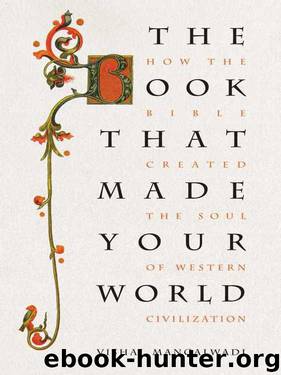The Book That Made Your World: How the Bible Created the Soul of Western Civilization by Vishal Mangalwadi

Author:Vishal Mangalwadi [Mangalwadi, Vishal]
Language: eng
Format: epub, mobi
Tags: Religion, Christianity, History
ISBN: 9781595555458
Google: g198MQEACAAJ
Amazon: 1595555455
Publisher: Thomas Nelson
Published: 2012-10-24T00:00:00+00:00
When we compare this tone of thought in Europe with the attitude of other civilizations when left to themselves, there seems but one source of its origin. It must come from the medieval insistence on the rationality of God, conceived as with the personal energy of Jehovah.10
Whitehead concluded that China failed to develop science because for much of its history it did not have a firm conviction in an almighty Creator.* Joseph Needham (1900–95), a Marxist historian who spent his life investigating Chinese science and civilization, confirmed Whitehead’s views. Needham searched for materialistic explanations for China’s failure. Finally, his integrity overcame his ideology. He concluded that there were no good geographical, racial, political, or economic reasons that explained the Chinese failure to develop science. The Chinese did not develop science because it never occurred to them that science was possible. They did not have science because “the conception of a divine celestial law-giver imposing ordinances on non-human nature never developed in China.”11
Premodern Greeks, Egyptians, Chinese, Indians, and Muslims had many insights into nature; they observed facts, noted information, developed skills, accumulated wisdom, and passed on their knowledge to others. We have good reasons to marvel at the accuracy with which Greek mathematician, astronomer, geographer, and poet Eratosthenes (ca. 276 BC–ca.196 BC) measured the circumference of the earth. He determined astronomically the difference in latitude between Syene (now Aswan) and Alexandria, Egypt, where he was the librarian. Our principle of floating bodies is named after Archimedes (287–212 BC), who also studied in Alexandria. His mathematical principles of the lever, pulley, and screw are impressive. Hipparchus (ca. 190–120 BC), who greatly influenced Ptolemy, calculated the solar year to within six minutes and fourteen seconds. His lunar month was off only by one second.
Despite their impressive achievements, the ancients did not develop a culture of science. While they observed accurately, they did not model the world. They made no effort to empirically verify their explanations. Not even Copernicus (1473–1543) formed a preliminary heliocentric theory. It was deeply Christian Isaac Newton (1642–1727) who modeled planetary orbits due to gravity. Without explanation, one can have facts but not science. As Charles Darwin noted:
About thirty years ago there was much talk that geologists ought to observe and not theorize; and I well remember someone saying that at that rate a man might as well go into a gravel-pit and count the pebbles and describe the colours. How odd it is that anyone should not see that all observation must be for or against some view if it is to be of any service.12
Download
The Book That Made Your World: How the Bible Created the Soul of Western Civilization by Vishal Mangalwadi.mobi
This site does not store any files on its server. We only index and link to content provided by other sites. Please contact the content providers to delete copyright contents if any and email us, we'll remove relevant links or contents immediately.
| Buddhism | Christianity |
| Ethnic & Tribal | General |
| Hinduism | Islam |
| Judaism | New Age, Mythology & Occult |
| Religion, Politics & State |
Cecilia; Or, Memoirs of an Heiress — Volume 1 by Fanny Burney(31341)
Cecilia; Or, Memoirs of an Heiress — Volume 3 by Fanny Burney(30938)
Cecilia; Or, Memoirs of an Heiress — Volume 2 by Fanny Burney(30896)
The Secret History by Donna Tartt(16644)
Sapiens: A Brief History of Humankind by Yuval Noah Harari(13067)
Leonardo da Vinci by Walter Isaacson(11913)
The Radium Girls by Kate Moore(10914)
Sapiens by Yuval Noah Harari(4546)
The Wind in My Hair by Masih Alinejad(4427)
How Democracies Die by Steven Levitsky & Daniel Ziblatt(4407)
Homo Deus: A Brief History of Tomorrow by Yuval Noah Harari(4287)
Endurance: Shackleton's Incredible Voyage by Alfred Lansing(3852)
The Silk Roads by Peter Frankopan(3771)
Man's Search for Meaning by Viktor Frankl(3644)
Millionaire: The Philanderer, Gambler, and Duelist Who Invented Modern Finance by Janet Gleeson(3574)
The Rape of Nanking by Iris Chang(3522)
Hitler in Los Angeles by Steven J. Ross(3443)
The Motorcycle Diaries by Ernesto Che Guevara(3340)
Joan of Arc by Mary Gordon(3262)
